For many Michigan residents, avoiding probate is a priority when planning their estate. One powerful tool for avoiding probate is an irrevocable trust. Understanding how these trusts work and whether they’re right for you is crucial.
The trusts attorneys at Law Office of Julie A. Paquette serve clients throughout Michigan and have extensive experience in estate planning, including the creation of irrevocable trusts. We can help you navigate the complexities of trust administration and ensure your wishes are carried out according to your plan.
Why Should You Avoid Probate in Michigan?
Probate is the legal process of administering a deceased person’s estate. It involves proving the validity of the will (if the deceased had one), identifying and appraising assets, paying off debts and taxes, and distributing the remaining assets to the beneficiaries. While probate is sometimes necessary, it can be time-consuming, expensive, and public. This means your family’s private affairs will become a matter of public record. Avoiding probate offers several advantages:
- Reduced Costs: Probate fees, court costs, and attorney fees can significantly reduce the value of your estate.
- Faster Distribution: Assets can be distributed to beneficiaries much more quickly with a trust than through probate.
- Privacy: A trust allows you to keep your estate matters private, avoiding your family’s personal business becoming a public record.
- More Control: You maintain control over how and when your assets are distributed, even after your death.
The estate planning attorneys at Law Office of Julie A. Paquette can help you assess whether avoiding probate through an irrevocable trust is the right choice for your situation.
What Is an Irrevocable Trust and How Do They Work?
An irrevocable trust is a legal arrangement where you transfer ownership of your assets to a trust. Once the trust is established, you generally cannot change or terminate it. This characteristic makes it a powerful tool for avoiding probate. Because the assets are no longer legally yours, they are not considered part of your estate and therefore do not go through probate.
Here’s a simplified overview of how an irrevocable trust functions:
- Grantor (You): The person who creates the trust and transfers assets into it.
- Trustee: The person or entity responsible for managing the trust assets according to the trust’s terms. This can be you (in some limited circumstances), a family member, a friend, or a professional trust company. Ultimately, this should be someone you are confident will follow your wishes and work in the best interests of your loved ones.
- Beneficiary: The person or people who will ultimately receive the assets from the trust.
Assets like real estate, stocks, or bank accounts are transferred into the trust. The trustee manages these assets for the benefit of the beneficiaries, following the instructions you outline in the trust document. These instructions can specify when and how the assets should be distributed.
How to Set Up an Irrevocable Trust in Michigan
Creating an irrevocable trust involves several key steps:
- Consulting with an Attorney: This is the most important step. An experienced estate planning attorney can guide you through the process and ensure the trust is properly drafted.
- Drafting the Trust Document: The trust document outlines the terms of the trust, including who the trustee and beneficiaries are, how the assets will be managed, and when they will be distributed.
- Transferring Assets: You must legally transfer ownership of your assets to the trust. This may involve deeds, stock certificates, and other legal documents.
The experienced attorneys at Law Office of Julie A. Paquette can handle all the legal aspects of setting up your trust, including drafting the document and ensuring the assets are properly transferred.
Contact Us to Learn More About Your Trust Options
Law Office of Julie A. Paquette is dedicated to helping Michigan residents with their estate planning needs. We can provide the guidance and support you need to create an irrevocable trust that meets your specific goals. Contact us today to see which option best suits your needs.



